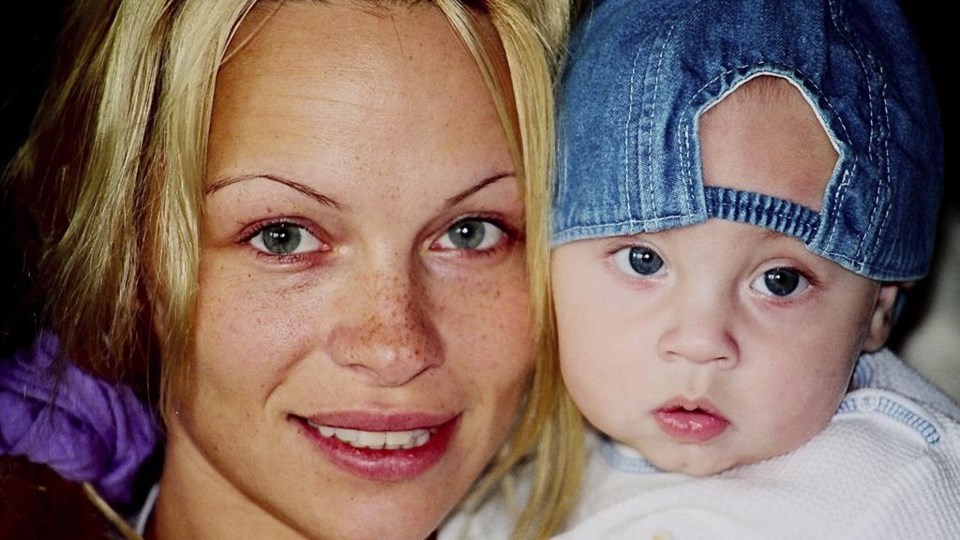Pamela Anderson was always a bit of an open book in interviews. No one ever told her not to be, or that because she talked about some things that she didn’t have to talk about everything. She didn’t know that she could draw her own line in the sand if a question made her feel uncomfortable.
And so she answered all manner of questions about her breasts, her body, her image, her boyfriends — partially because she was gracious and self-deprecating, partially because her body was, in some ways, her meal ticket and partially because the people asking these questions were more often than not respected journalists working for respected outlets.
From the moment that audience camera zoomed in on her in the Labatt T-shirt at a Canadian football game in 1989, the image of Pamela Anderson was, essentially, no longer her own. It belonged to everyone else.
By the time private home videos showing her and husband Tommy Lee having sex were stolen, reproduced and distributed for sale globally, no one seemed all that horrified on her behalf. They couldn’t even fake it when speaking to her. She wasn’t a person; She was just an object. And then, in some ways, it was done all over again many years later when the Hulu series “Pam & Tommy” was made without her involvement or consent.
“ Pamela, a Love Story,” a new documentary from filmmaker Ryan White, gives Anderson the chance to tell her story her own way, from her earliest days to her Playboy debut, her “Baywatch” fame, her many marriages and up through her recent run on Boardway. She is still that open book, disarmingly funny and candid and uncynical, sitting there beautifully makeup free, letting the filmmakers and audience peer into her soul through many pages of journals going back to her childhood. It is a captivating watch, especially for those who never thought much about her at all.
Anderson’s life was and is immensely complex. Her parents’ relationship was volatile and sometimes violent. They lived on welfare for a time and she still remembers the taste of the powdered milk. She had a female babysitter who molested her for years. At age 12 she was raped by a 25-year-old. She learned early to leave her body and make her own little world, she says, and she knew from a young age that she had to get off of that island.
Like many women before and after her, Anderson didn’t feel beautiful growing up and after the sexual trauma, her body was a source of secret shame. Ironic that it was her body that would be her ticket out, ultimately. But modeling felt like playing a character, she said. Even when mostly nude, it didn’t feel like herself. Sometimes it was even fun.
There is a breeziness to Anderson, who, despite everything, does not think of herself as a victim. She doesn’t regret marrying Tommy Lee after four days of knowing him — her account of the quick courtship is quite amusing. At a certain point, though sick of always having to talk about her breasts, she used her image for a cause she cared about: PETA. She even sat through a roast under the condition that a sizable donation be made to the organization. She is a hopeful romantic who is hard not to root for.
She has made peace with many, many things, some simply by refusing to dwell, but one thing that still stings is the tape — such a clear violation of her privacy that you wonder what sort of culture and legal system would allow it to get as out of control as it did. That a series would attempt to make entertainment out of it just reopened old wounds and traumas. Even if it was done out of some altruistic motive to reframe the recent past, for Anderson, it was another group of people making money off of, what her son calls, the worst thing that’s ever happened to her.
As this documentary reminds, Anderson is still right here. She’s not some distant, deceased figure who needs to be speculated about or saved by miniseries. You can just ask her how she felt about it then, how she feels about it now: She’ll tell you.
You wonder if no one thought to ever ask her the right questions before, if we just weren’t listening carefully enough, or the wrong people were in the position to ask the questions. But I’m glad that this era of the biographical documentary is going strong, allowing for people like Anderson to correct the record themselves.
Besides, at 54 she’s moved on and has surprises yet, including a well-received Broadway run as Roxie Hart in “Chicago.” “Nowadays” would have been a canny choice for a closing montage for a documentary like this, but hearing it in Anderson’s perfectly imperfect voice is simply revelatory.
“Pamela, a Love Story,” a Netflix release streaming Tuesday, is rated TVMA. Running time: 122 minutes. Three stars out of four.
—-
Follow AP Film Writer Lindsey Bahr on Twitter: www.twitter.com/ldbahr.
Lindsey Bahr, The Associated Press



